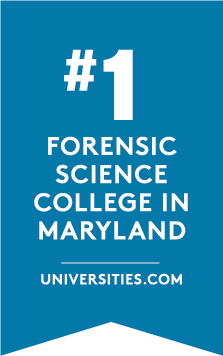Crime Scene Investigation
Why This Certificate is For You
The demand for qualified crime scene investigators is surging across security and police sectors. Professionals need expertise in both procedural crime scene processing and strong investigative techniques.
Law, Justice and Public Affairs
Program Type
Locations/Format
Cost
Undergraduate
Tuition and Fees
Requirements
A 12-Credit Upper-Division Certificate
Quick Links
crime scene investigation Certificate
An Undergraduate, Upper-division Certificate
Demand is growing nationwide for crime scene investigators, both in security and police fields. But not just any crime scene investigators; these fields require investigators who not only are familiar with the procedures to record and process crime scenes appropriately but who also have the relevant investigative skills.
Train in our Labs
 Maryland's No. 1 Forensic Science College for 2024
Maryland's No. 1 Forensic Science College for 2024
Universities.com has again ranked The University of Baltimore the No. 1 forensic science college in Maryland for 2024. Check out all of UBalt's renowned undergraduate and graduate forensics offerings.
Among the best in the U.S.
Study.com has ranked our bachelor of science program as No. 5 among the best bachelor's degrees in computer forensics in the country.
How the program Works:
This 12-credit, four-course undergraduate certificate program for students with a minimum of 60 transferable credits offers you the courses necessary to become a crime scene investigator within the police framework and can be completed in one year or less.
This certificate is ideal if you:
- have a different undergraduate degree and are interested in changing your career path
- are currently a crime scene investigator but lack the academic credentials and require continuing education
- don't have a science degree and are looking for an alternative path to becoming a crime scene investigator.
Admission Information
- a 2.5 cross-institutional cumulative grade point average
- a minimum of 60 transferable credits
- successful completion of CRJU 301 The Contemporary Criminal Justice System or an equivalent
course OR
experience in a law enforcement agency, as determined by the program director - permission of the program director
- When you're ready, our online application will only take you a few minutes to complete. Before you submit the application, you’ll be asked to use your credit card or bank account to pay the $35 application fee.
- Insider tips: The earlier you apply and submit a completed application, the faster you’ll receive
an admission decision. Each one of your supporting admission documents may be sent
individually. Your admission portal will keep track of what the UBalt Admission team
has received.
- When you attend an information session or discuss your application with an Admission counselor be sure to get your application fee waiver code and save yourself $35.
- Official transcript(s). Request that an official transcript of all prior college or university work (including graduate courses, if applicable) be sent directly from each institution attended; electronic transcripts sent to documents@ubalt.edu are encouraged.
What Our Graduates Do
When you graduate, you'll learn:
- how to protect and secure a crime scene
- how to fully document the crime scene using text and photography
- how to record and collect evidence, maintaining the scientific integrity of the evidence in addition to the legal chain of custody
- how to present and defend the findings of the investigation within a legal framework, either in courts or in deposition.
Common Roles
- Forensic Investigator
- Forensic Examiner
- Crime Scene Investigator
- Crime Scene Analyst
- Crime Scene Technician

A Message from Dean Roger Hartley
Read Full StoryWe believe that public service is the highest of callings, and an opportunity to spend a fantastic career improving lives.








